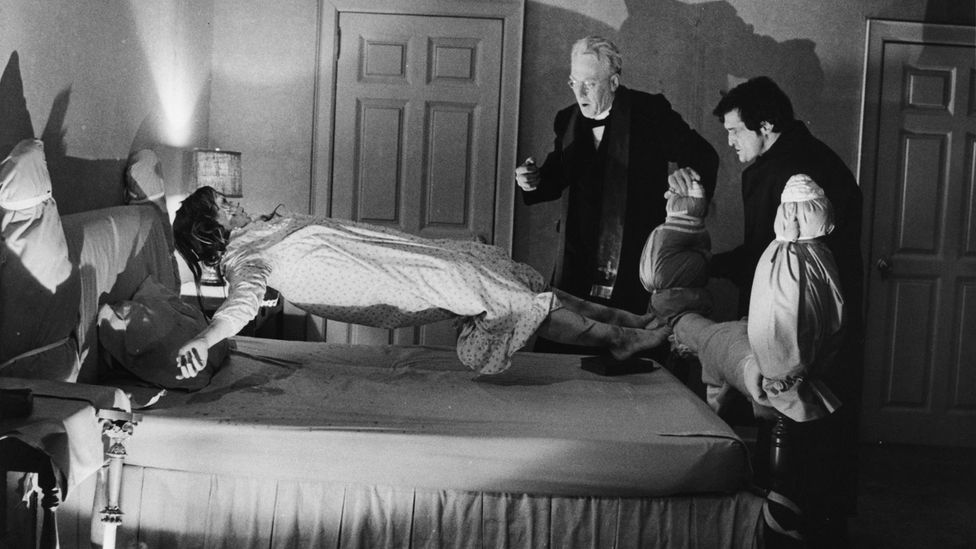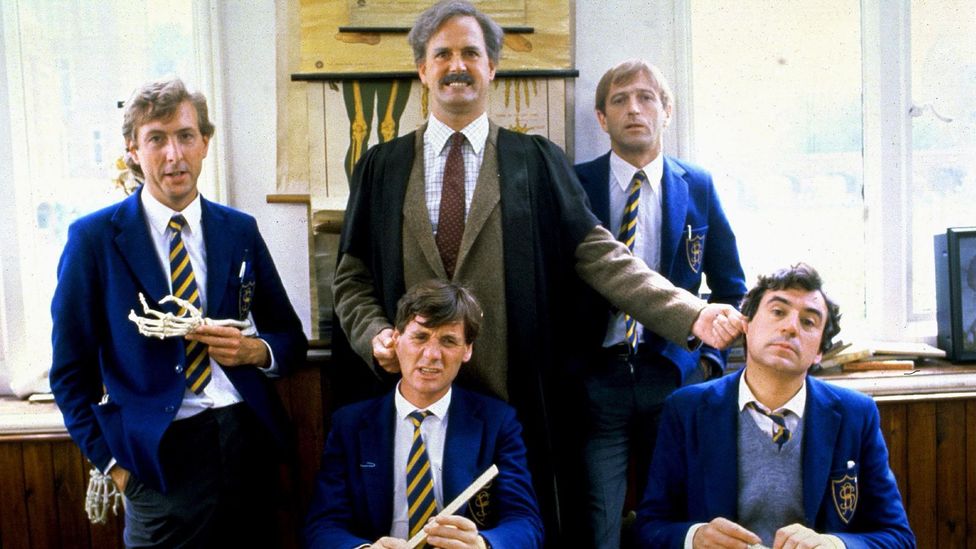Life of Brian: The most blasphemous film ever? - BBC News
It may not be true that all publicity is good publicity, but in the case of Monty Python's Life of Brian, which was released 40 years ago, some of the bad publicity was heaven-sent. The comedy team's irreverent Biblical romp had been due to open on 200 screens across the US, but after various religious groups protested against it, the number of screens was tripled. "They actually made me rich," said John Cleese of the protesters on one American talk show. "I feel we should send them a crate of champagne or something."
More like this:
- The subversive messages hidden in The Wizard of Oz
- The greatest film never made?
- The films that defined Generation X
The idea for Life of Brian came about when the team was promoting its previous film, Monty Python and the Holy Grail. Eric Idle joked that their next project would be called "Jesus Christ: Lust For Glory", and his team-mates realised that no one had ever made a comedy about the Messiah. Initially, they planned to lampoon Jesus himself, but the more they read up on him, the less keen they were. "It was quite obvious that there was very little to ridicule in Jesus's life, and therefore we were onto a loser," said Michael Palin in 1979. "Jesus was a very straight, direct man making good sense, so we decided it would be a very shallow film if it was just about [him]."
They moved onto the character of Brian, a 13th disciple who never made it into the Bible because he always arrived five minutes late and missed the miracles. But they eventually settled on the premise that the hapless Brian (Graham Chapman) wouldn't have any connection with Jesus at all; he would be someone who happened to live in Roman-occupied Judea at the same time, and who was mistaken for a Messiah by the fanatical masses.
John Cleese claimed that Life of Brian was "about people who cannot agree with each other" (Credit: Alamy)
The Pythons' satire wouldn't target Jesus or his teachings, instead caricaturing political militants, credulous crowds, the appeal of throwing stones at people, the complexities of Latin grammar, and the difficulties of being a tyrant when you've got a speech impediment. "I thought we'd been quite good," said Idle in Robert Sellers' behind-the-scenes book, Very Naughty Boys. "We'd avoided being specifically rude to specific groups."
Taking offence
It seemed, though, that they hadn't been quite good enough. Terry Jones was about to start directing the film in Tunisia when the Chief Executive of EMI, Bernard Delfont, finally got around to reading the script, and declared that there was no way his company could fund such an atrocity. The project's unlikely saviour was George Harrison, the ex-Beatle. A friend of Idle's and a fan of the Pythons, he volunteered to remortgage his house and chip in the £2million ($4.1million) the team needed – a bail-out which has become known as 'the most expensive cinema ticket' ever issued.
In a discussion years after Life of Brian's release, Terry Jones said: "I think the film is heretical, but it's not blasphemous" (Credit: Alamy)
What is even more striking about Harrison's investment is that he knew how dangerous it could be to offend Christian sensibilities. In 1966, as Beatlemania raged, John Lennon was interviewed by Maureen Cleave in London's Evening Standard newspaper, and made the remark that would haunt him ever afterwards: "We're more popular than Jesus now; I don't know which will go first – rock 'n' roll or Christianity." The blowback included threats, the picketing of concerts, and the burning of Beatles records on bonfires. Lennon's killer even cited the comment as one excuse for the murder. But back in 1966, Harrison was unruffled. "Why is there all this stuff about blasphemy?" he asked in the Evening Standard. "If Christianity's as good as they say it is, it should stand up to a bit of discussion." Evidently, he still held that opinion when Idle asked for a little help from his friend.
Once Life of Brian was completed, not everyone was so calm. Some countries, such as Ireland and Norway, banned it outright. (In Sweden it was advertised as being 'so funny it was banned in Norway'.) In the US, Rabbi Abraham Hecht, President of the Rabbinical Alliance of America, told Variety magazine: "Never have we come across such a foul, disgusting, blasphemous film before."
John Cleese disagreed with Jones's take, arguing: "I don't think it's a heresy. It's making fun of the way that people misunderstand the teaching" (Credit: Alamy)
In New York, there were picketers outside cinemas, with placards proclaiming that the troupe's name gave away its diabolical nature: 'Python = Serpent = Satan'. But in Very Naughty Boys, Terry Gilliam noted one positive aspect of these protests: "I thought at least getting the Catholics, Protestants and Jews all protesting against our movie was fairly ecumenical on our part... We had achieved something useful."
Rules of debate
In Britain, opposition wasn't as fierce, but there was plenty of it. Some local councils banned the film, a measure which did it no harm at all: people would simply flock to the nearest city where it was showing. In November 1979, Cleese and Palin appeared on Friday Night, Saturday Morning, a talk show hosted by Tim Rice, where they debated their work with Malcolm Muggeridge, an evangelical journalist and satirist, and Mervyn Stockwood, the Bishop of Southwark. Or rather, Cleese and Palin did the debating, while Muggeridge and Stockwood sneered at them and their "10th-rate film". Again, the long-winded condescension of a pair of ageing grandees didn't deter audiences. Life of Brian was the UK's fourth highest grossing film in 1979.

Showing the demonic possession of a young girl, The Exorcist became the first horror film to be nominated for a best picture Oscar (Credit: Alamy)
The lesson, it seems, is that however vehement and sincere they may be, protests against religious-themed films rarely have the effect that the protesters are praying for. When The Exorcist was released, churchgoers handed out leaflets urging cinema-goers to stay away – despite the insistence by its screenwriter and producer, William Peter Blatty, that it was a pro-church film – but it raked in $110 million (£45million) during its initial run, making it the US's second highest grossing film of 1974. In 2006, Ron Howard's The Da Vinci Code, adapted from Dan Brown's bestseller, was denounced as anti-Catholic. That, too, ranked as the US's second most lucrative film of the year.

The Meaning of Life won the Grand Prix at the 1983 Cannes Film Festival (Credit: Alamy)
The protests didn't faze Monty Python, either. The team followed Life of Brian with a comedy that was far more heretical, 1983's The Meaning of Life. Again directed by Jones, it features a glitzy song-and-dance number parodying Catholic attitudes towards contraception, Every Sperm is Sacred, and a service in a school chapel, where Cleese's schoolmaster sends up the obscurity and dullness of certain Old Testament passages: "And so the Midianites went forth to Ram Gilead in Kadesh Bilgemath by Shor Ethra Regalion, to the house of Gash-Bil-Betheul-Bazda, he who brought the butter dish to Balshazar and the tent peg to the house of Rashomon..." Palin's chaplain then leads the congregation in a grovelling psalm: "Oh Lord, ooh, you are so big. So absolutely huge. Gosh, we're really impressed down here, I can tell you." And then comes a fearful hymn: "O Lord, please don't burn us. / Don't grill or toast your flock. / Don't put us on the barbecue / Or simmer us in stock."
Nothing in Life of Brian was as audacious as that, and yet The Meaning of Life didn't result in bans or boycotts – and it didn't do anywhere near as well at the box office. Maybe Cleese should have sent some crates of champagne to religious groups and asked them to protest.
Love film? Join BBC Culture Film Club on Facebook, a community for film fanatics all over the world.
If you would like to comment on this story or anything else you have seen on BBC Culture, head over to our Facebook page or message us on Twitter.
And if you liked this story, sign up for the weekly bbc.com features newsletter, called The Essential List. A handpicked selection of stories from BBC Future, Culture, Worklife and Travel, delivered to your inbox every Friday.



Comments
Post a Comment